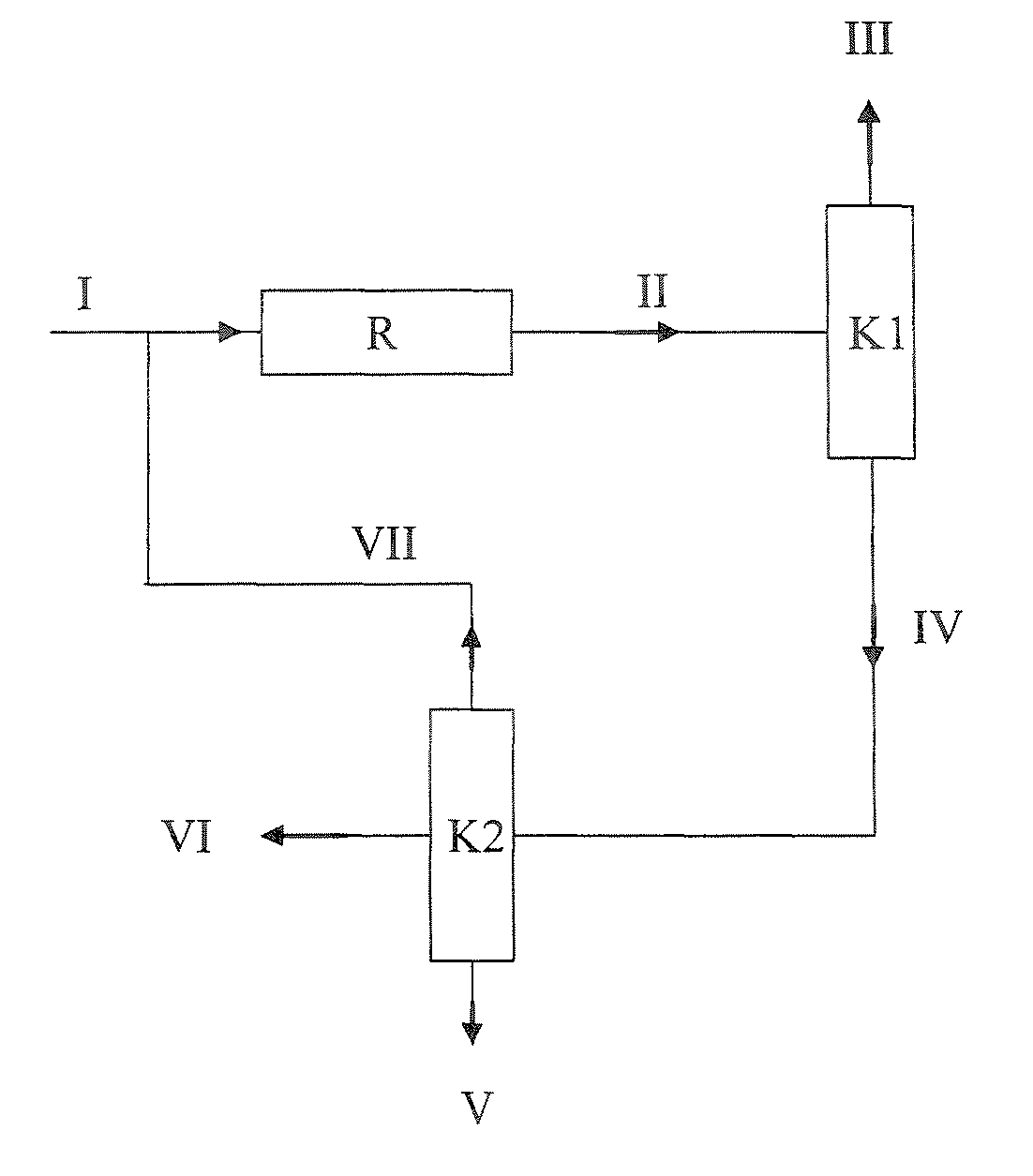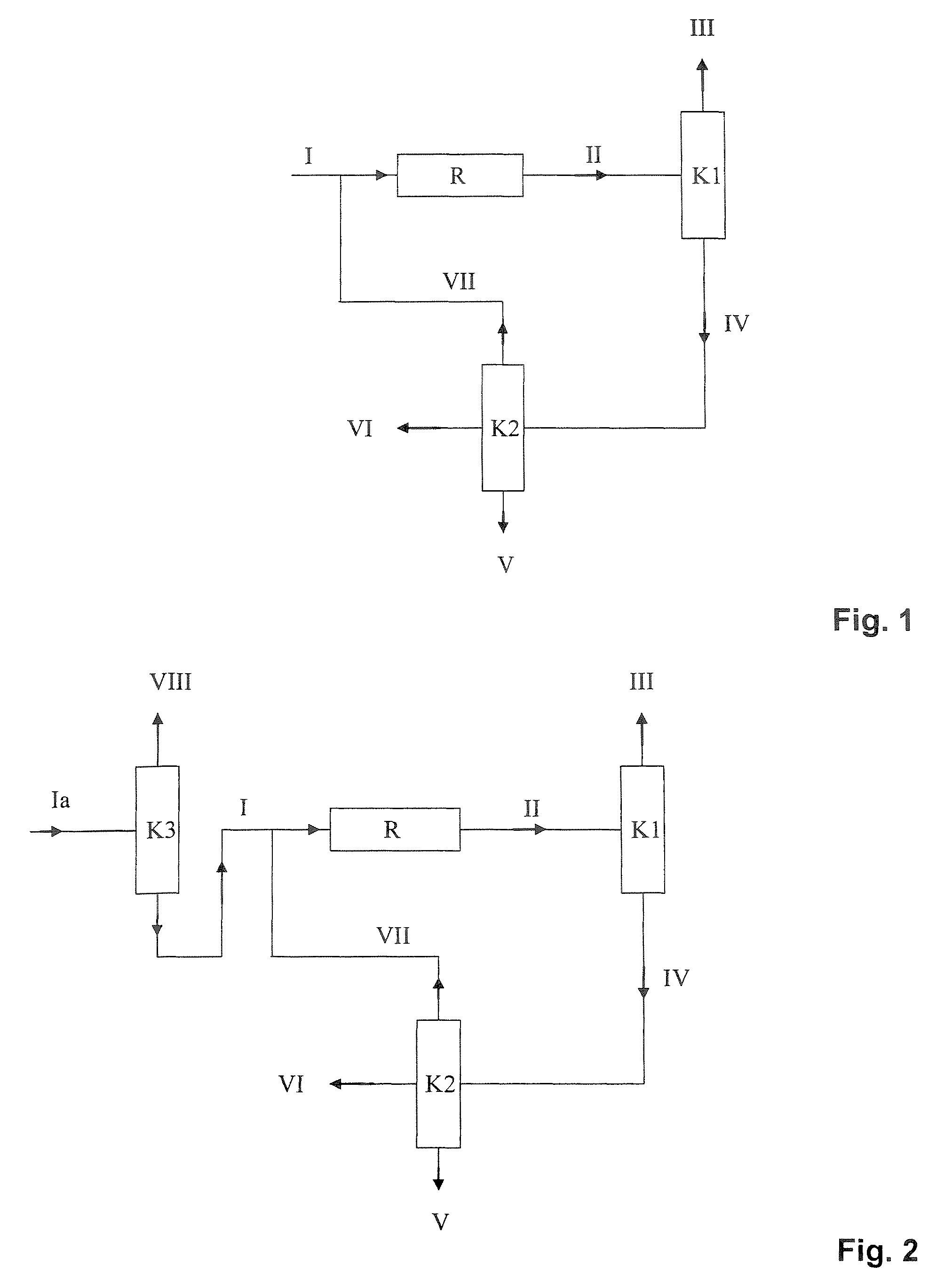Process for the dissociation of MTBE
a technology of mtbe and dissociation, which is applied in the field of process for preparing isobutene, can solve the problems of dispensing of by-products from unreacted mtbe, and isobutene cannot be economically separated from these mixtures
- Summary
- Abstract
- Description
- Claims
- Application Information
AI Technical Summary
Benefits of technology
Problems solved by technology
Method used
Image
Examples
example a
Production of a Shaped Aluminosilicate Body
[0143]500 g of aluminosilicate powder (manufacturer: Grace Davison, grade: Davicat O 701, formal Al2O3 content: 13% by mass, formal SiO2 content: 76% by mass, formal Na2O content: 0.1% by mass, loss on ignition at 850° C.: about 11%), 363 g of Disperal gel (formal Al2O3 content: 15.6%), which is obtained by stirring 197 g of Disperal, a boehmite having a formal Al2O3 content of 77% by mass from Sasol Deutschland GmbH, into 803 g of a 1.28% strength by mass aqueous nitric acid, subsequently stirring vigorously so that the gel being formed is continually sheared and is thus kept in a fluid state in a covered container for 3 hours at 60° C., cooling the gel to room temperature and replacing any water which has evaporated, and 370 g of deionized water were firstly mixed thoroughly with one another in a high-intensity mixer from Eirich. Pelletization was subsequently carried out in the high-intensity mixer from Eirich, giving uniform roundish pe...
example b
Production of a Shaped Catalyst (According to the Invention)
[0144]An impregnation solution having a magnesium content of 4.7% by mass was produced from deionized water and magnesium nitrate hexahydrate. The pH of this solution was 5.1. A sieve fraction of the aluminosilicate support produced in Example 1 (diameter: 1.0 mm-2.8 mm) was impregnated with the acidic magnesium nitrate solution by vacuum impregnation. For this purpose, the pellets were placed in a glass tube and the latter was evacuated for about 30 minutes (water pump vacuum of about 25 hPa). The impregnation solution was subsequently sucked in from the bottom to above the upper surface of the bed of solid. After a contact time of about 15 minutes, the solution which had not been taken up by the support was drained. The moist pellets were firstly dried to constant weight at 140° C. in a stream of air and subsequently heated at 3 K / min to 450° C. and calcined at this temperature for 12 hours. The catalyst produced formally...
example 1
[0148]Example 1 corresponds to the variant shown in FIG. 1. An MTBE stream (I) (feed MTBE) of 1000 kg / h having the composition shown in Table 4 (typical fuel MTBE, cf. Table 1) was assumed as feed to the MTBE dissociation plant, as shown in FIG. 1. Since it was assumed in this example that a relatively high concentration of linear butenes, saturated C4-hydrocarbons and C5-hydrocarbons in the isobutene product was not a problem, a column K3 as shown in FIG. 2 was omitted and the reactor was operated at relatively high conversions.
[0149]
TABLE 4Composition of the assumed MTBE inflow stream into the MTBEdissociation plant for Example 1FeedMTBE (I)Mass flow [kg / h]1000.00Proportions by mass [kg / kg]Dimethyl etherIsobutene1-Butene / 2-butenes0.001000Pentanes0.001500MTBE0.9819502-Methoxybutane0.002500Methanol0.008500tert-Butanol0.002000Water0.000050Diisobutene0.002500
[0150]The feed MTBE (I) was mixed with the recycle stream (VII) to give the MTBE stream which was introduced as feed into the re...
PUM
| Property | Measurement | Unit |
|---|---|---|
| temperature | aaaaa | aaaaa |
| temperature | aaaaa | aaaaa |
| temperature | aaaaa | aaaaa |
Abstract
Description
Claims
Application Information
 Login to View More
Login to View More - R&D
- Intellectual Property
- Life Sciences
- Materials
- Tech Scout
- Unparalleled Data Quality
- Higher Quality Content
- 60% Fewer Hallucinations
Browse by: Latest US Patents, China's latest patents, Technical Efficacy Thesaurus, Application Domain, Technology Topic, Popular Technical Reports.
© 2025 PatSnap. All rights reserved.Legal|Privacy policy|Modern Slavery Act Transparency Statement|Sitemap|About US| Contact US: help@patsnap.com


